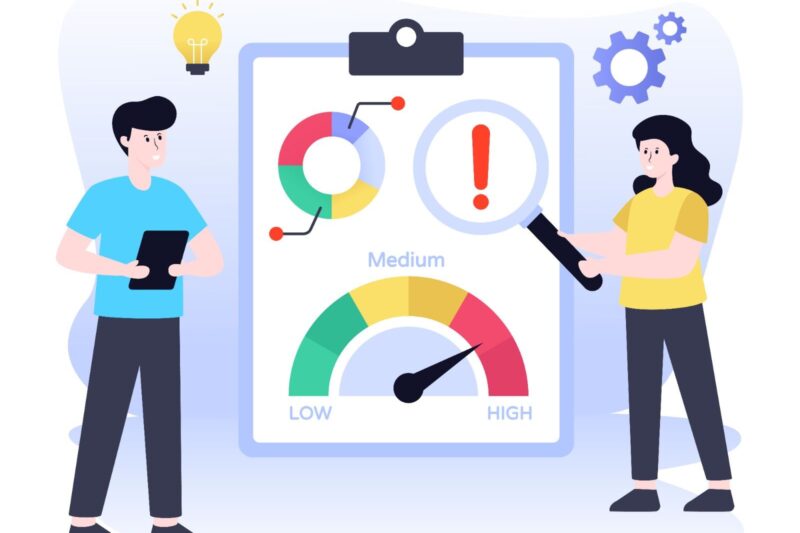Imagine the frustration of a budding entrepreneur, brimming with confidence in her burgeoning food delivery startup, only to be denied a crucial loan for expansion. Her shock turns to disbelief when she discovers her credit score, inexplicably lower than expected, riddled with phantom “loan accounts” she never authorized. This scenario, tragically common, underscores the insidious nature of credit score manipulation, a silent threat to financial well-being.
In an era where credit scores dictate access to essential financial services, their integrity is paramount. A favorable score unlocks doors to lower interest rates, advantageous loan terms, and a plethora of financial opportunities. Conversely, a compromised score can severely restrict your financial mobility. But what happens when the very foundation of this system—your credit score—is compromised by errors, data breaches, or deliberate tampering?
Credit score manipulation, a multifaceted issue, affects countless individuals globally. Understanding its mechanisms and implications is crucial for safeguarding your financial identity and ensuring fair access to credit.
Delving Deeper: The Anatomy of Credit Score Manipulation
Credit score manipulation encompasses any action that alters the data or algorithms used to calculate your credit score, resulting in an artificially inflated or deflated score. This manipulation can manifest in various forms, each with its own set of risks and consequences.
1. The Deceptive World of Credit Repair Scams and Fraudulent Techniques
Credit repair scams prey on vulnerable individuals seeking quick fixes for their credit woes. These unscrupulous companies often promise miraculous improvements, employing dubious tactics that range from filing frivolous disputes to exploiting loopholes in outdated credit reporting systems.
- Credit Piggybacking: A Trojan Horse:
- Credit piggybacking, a seemingly innocuous practice, involves adding individuals as authorized users to credit card accounts with stellar credit histories. This “borrowed” creditworthiness artificially inflates the secondary user’s score, creating a false impression of financial responsibility.
- While seemingly harmless, piggybacking can lead to unforeseen consequences. If the primary account holder defaults or engages in irresponsible credit behavior, the secondary user’s score can plummet.
- Furthermore, lenders are increasingly aware of piggybacking and may scrutinize applications more closely if they suspect artificial score inflation.
- The Illusion of Erased Negative Items:
- Credit repair scams often promise to erase negative items from credit reports, such as late payments or collection accounts. However, these “fixes” are often temporary, relying on technicalities or outdated systems.
- Legitimate lenders are adept at detecting such manipulations and may view them as red flags, indicating a lack of financial integrity.
- It is also illegal for these companies to make false claims.
- The Psychological Toll:
- These scams often take advantage of people in desperate situations, leading to further financial hardship, and a sense of hopelessness.
2. The Shadow of Data Breaches and Identity Theft
In the digital age, data breaches have become increasingly prevalent, posing a significant threat to credit score integrity. Identity thieves exploit these breaches to gain access to sensitive personal information, which they use to open fraudulent accounts or apply for loans in the victim’s name.
- The Ripple Effect of Unpaid Debts:
- By the time victims discover the fraud, their credit scores may have suffered irreparable damage due to unpaid debts they never incurred.
- The process of disputing fraudulent charges and restoring creditworthiness can be time-consuming and emotionally taxing.
- The Rise of Synthetic Identity Theft:
- This is a more sophisticated form of identity theft, where criminals combine real and fake information to create a new identity. This makes it harder for fraud detection systems to identify the crime.
- The Global Impact:
- With the rise of digital banking and e-commerce, the risk of data breaches and identity theft has become a global concern, affecting individuals across borders.
3. The Silent Saboteur: Errors in Credit Reporting
Human error is an inevitable part of any system, and credit reporting is no exception. Inaccurate information on credit reports can lead to significant discrepancies in credit scores.
- The Prevalence of Errors:
- Studies have shown that a significant percentage of credit reports contain errors, ranging from incorrect payment histories to mistaken identities.
- These errors can arise from various sources, including data entry mistakes, system glitches, and identity mix-ups.
- The Burden of Correction:
- While consumers have the right to dispute errors on their credit reports, the process can be cumbersome and time-consuming.
- The burden of proof often falls on the consumer, requiring them to gather documentation and navigate complex dispute processes.
- The Impact of Similar Names:
- People with similar names are at a higher risk of having their credit reports mixed up.
4. The Evolving Landscape: Misuse by Third-Party Data Collectors
The rise of fintech has led to increased reliance on alternative data sources, such as mobile payment history and utility bill payments, to assess creditworthiness. While these data sources can enhance financial inclusion, they also introduce new risks of manipulation.
- The Challenge of Data Accuracy:
- Alternative data sources may not always be as accurate or reliable as traditional credit data, increasing the risk of errors and miscalculations.
- The lack of standardized reporting and verification processes can further exacerbate these issues.
- The Potential for Bias:
- Algorithms used to analyze alternative data may contain biases, leading to unfair or discriminatory credit scoring.
- This is an area that is being looked at very closely by regulators.
- The Importance of Data Privacy:
- The collection and use of alternative data raise significant privacy concerns, requiring robust safeguards to protect consumer data.
The Ripple Effect: Why Credit Score Manipulation Matters
The consequences of credit score manipulation extend far beyond a mere numerical discrepancy.
- The Cost of Higher Loan Rates:
- A manipulated or inaccurate credit score can result in higher interest rates on loans, adding thousands of dollars to the total cost of borrowing.
- The Barriers to Financial Opportunity:
- Incorrect or fraudulent scores can block access to essential financial products, such as mortgages, auto loans, and business loans, hindering financial mobility.
- The Long-Term Impact on Financial Well-Being:
- Building a strong credit score takes years of responsible financial behavior, and manipulation can undo this hard work in a matter of minutes, causing long-term financial hardship.
- The Psychological Stress:
- The stress of dealing with fraud and repairing damaged credit can cause huge amounts of psychological stress.
Empowering Yourself: Protecting Your Credit Score
In a world where credit scores reign supreme, proactive measures are essential to safeguard your financial identity.
- The Power of Regular Credit Report Reviews:
- Regularly reviewing your credit reports from major credit bureaus like TransUnion and IBIL in India is crucial for detecting errors and fraudulent activity early on.
- Set reminders to review your reports at least once a year, or more frequently if you suspect any issues.
- The Importance of Due Diligence:
- Exercise caution when dealing with credit repair companies, and conduct thorough research before engaging their services.
- Be wary of companies that make unrealistic promises or guarantee quick fixes.
- The Value of Vigilance:
- Monitor your credit activity closely for any unexplained changes, suspicious inquiries, or unfamiliar accounts.
- Set up alerts to receive notifications of any changes to your credit report.
- The Art of Dispute Resolution:
- If you discover any discrepancies on your credit report, file disputes with the credit bureaus immediately.
- Gather supporting documentation and follow up on the status of your disputes.
- The Digital Footprint Awareness:
- Familiarize yourself with how your digital activities, such as social media usage and online transactions, may influence your credit score.
- Practice good digital hygiene and protect your personal information online.
- The Power of Education:
- Learn about how credit scores are calculated and what factors affect them.
- The more educated you are, the better you can protect yourself.
- Utilizing Credit Monitoring Services:
- These services can alert you to changes to your credit file.
The Role of Regulation and Technology
Regulators and technology play a vital role in combating credit score manipulation.
- The Strength of Regulatory Frameworks:
- Strong regulatory frameworks, such as those implemented by the Reserve Bank of India, are essential for protecting consumers from credit manipulation.
- Regulations should emphasize transparency, data security, and consumer rights.
- The Potential of Technology:
- Advanced technologies, such as artificial intelligence and blockchain, can be used to detect and prevent credit fraud.
- Biometric authentication and data encryption can enhance data security and protect consumer information.
- The Need for Collaboration:
- Credit bureaus, lenders, and consumers must work together to combat credit fraud.
Final Thoughts: Fortifying Your Financial Fortress and Taking Ownership of Your Credit Narrative
Credit scores, in the modern financial landscape, are not mere numerical representations; they are the keystones of your financial identity, dictating access to opportunities and shaping your financial destiny. The specter of credit score manipulation, with its insidious mechanisms and far-reaching consequences, demands our unwavering attention and proactive defense.
We’ve explored the diverse avenues through which credit scores can be compromised: the deceptive allure of credit repair scams, the pervasive threat of data breaches and identity theft, the silent sabotage of reporting errors, and the evolving risks associated with alternative data sources. Each of these represents a vulnerability, a potential breach in the fortress of your financial well-being.
However, knowledge is power. Understanding the anatomy of credit score manipulation empowers you to become a vigilant guardian of your financial identity. Regular credit report reviews, diligent monitoring of credit activity, and a healthy skepticism towards unrealistic promises are not merely prudent practices; they are essential safeguards in a world where financial data is constantly under threat.
Moreover, we must recognize that safeguarding credit scores is not solely an individual responsibility. It requires a collective effort and a collaborative approach involving consumers, credit bureaus, lenders, and regulators. Robust regulatory frameworks, such as those implemented by the Reserve Bank of India, play a crucial role in establishing a secure and transparent financial ecosystem. Technological advancements, from AI-powered fraud detection to blockchain-based data security, offer promising avenues for enhancing protection.
But beyond the technical and regulatory aspects, there lies a fundamental principle: the importance of financial literacy. Empowering yourself with knowledge about credit scores, lending practices, and data security is the most potent weapon against manipulation. It allows you to make informed decisions, identify red flags, and assert your rights as a consumer.
In an increasingly digital and interconnected world, the lines between physical and virtual financial identities are blurring. Our digital footprints, from online transactions to social media activity, can influence our creditworthiness. Therefore, practicing good digital hygiene, protecting personal information, and understanding the implications of data sharing are essential for maintaining a healthy credit profile.
Let us remember that credit is built on trust—trust between lenders and borrowers, between individuals and institutions. Credit score manipulation undermines this trust, eroding the foundation of a fair and equitable financial system. By staying vigilant, proactive, and informed, we can reclaim control over our financial narratives and build a future where credit empowers, rather than restricts.
Let the vigilance and education you obtain, become a legacy passed down to future generations. Instilling the importance of financial responsibility, and the proper ways to navigate the complex credit systems, will build a stronger and more protected future for all. Do not let manipulation steal your peace of mind or your financial future. Be proactive, be educated, and be in control.



